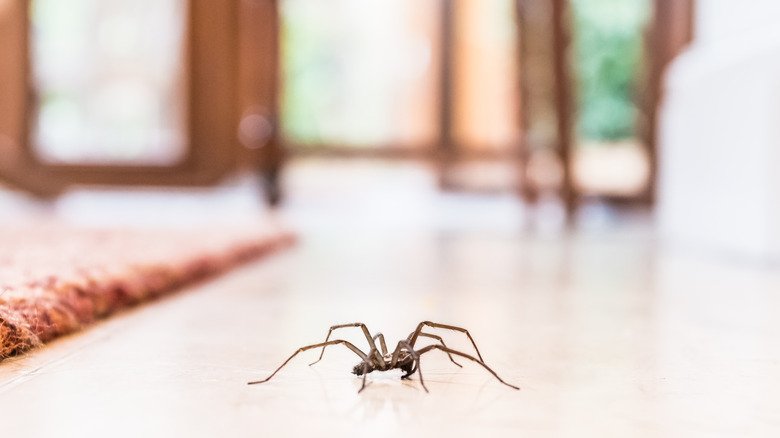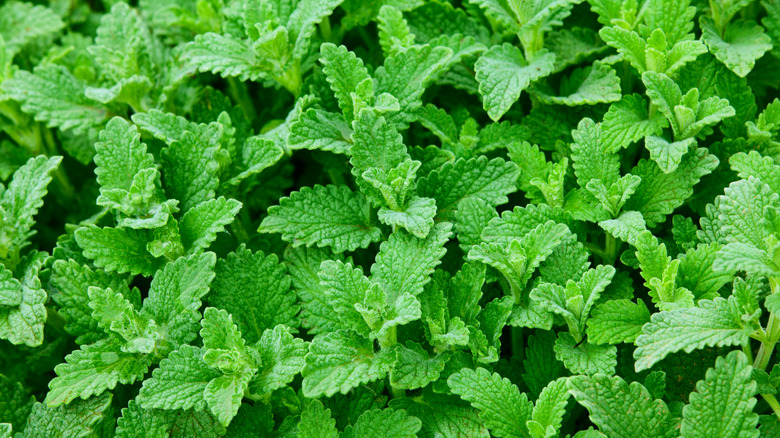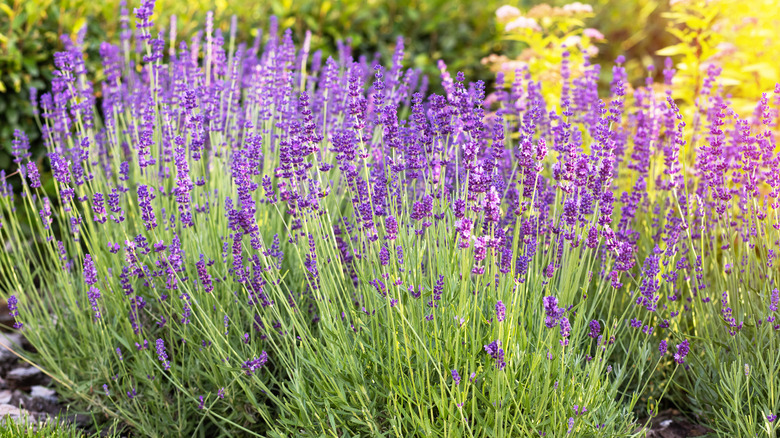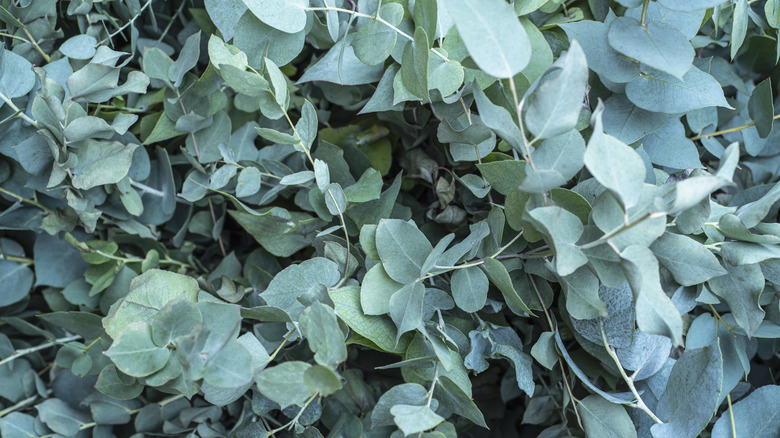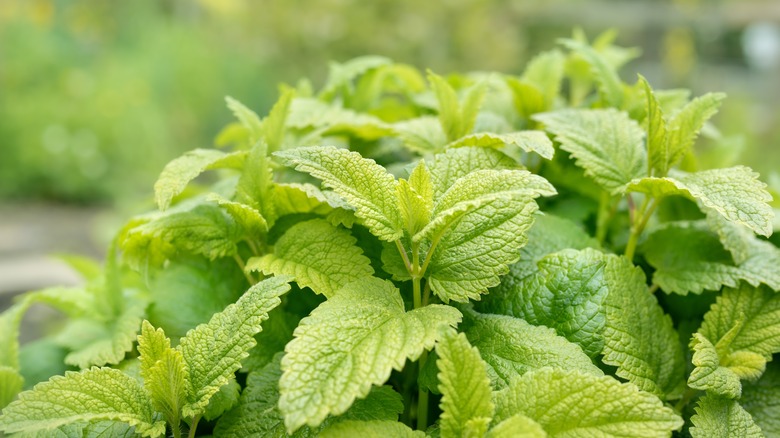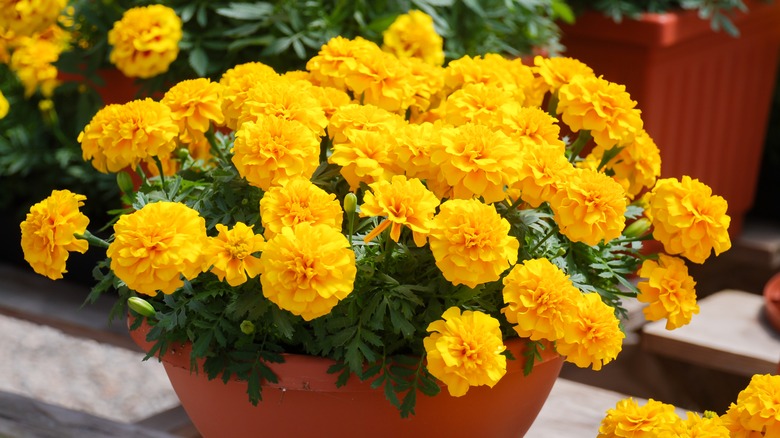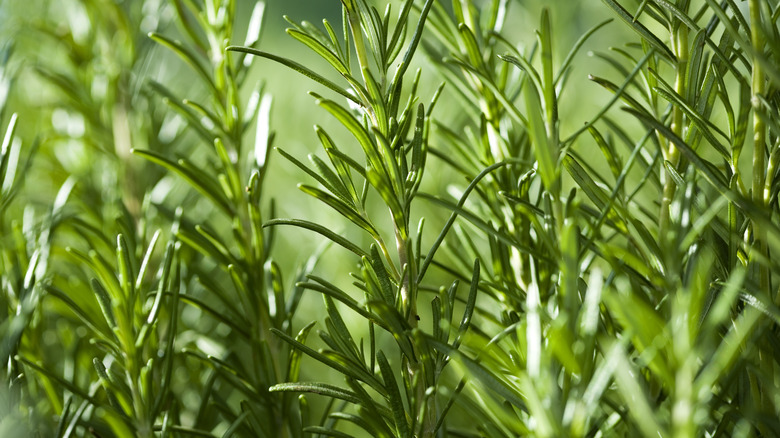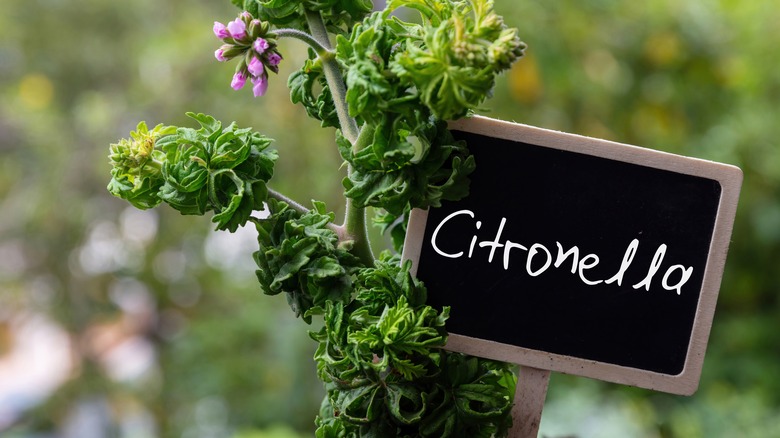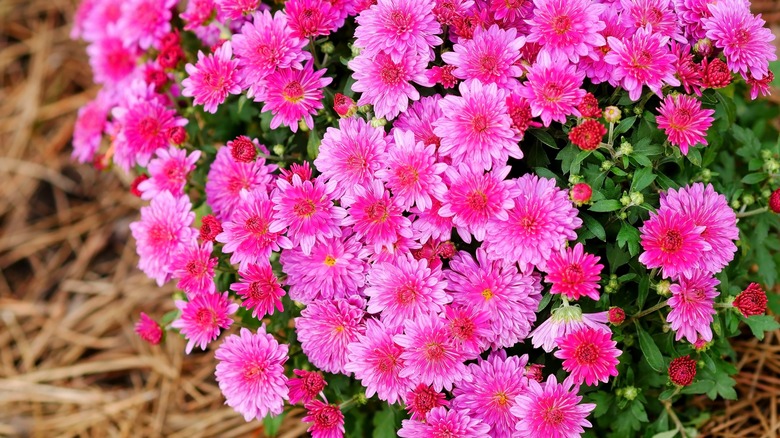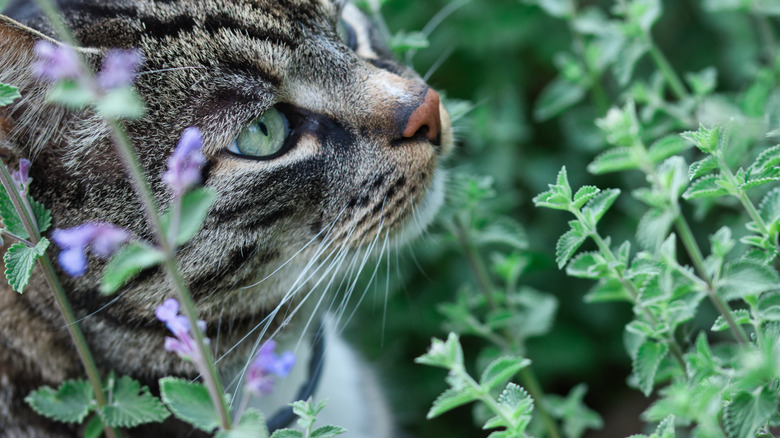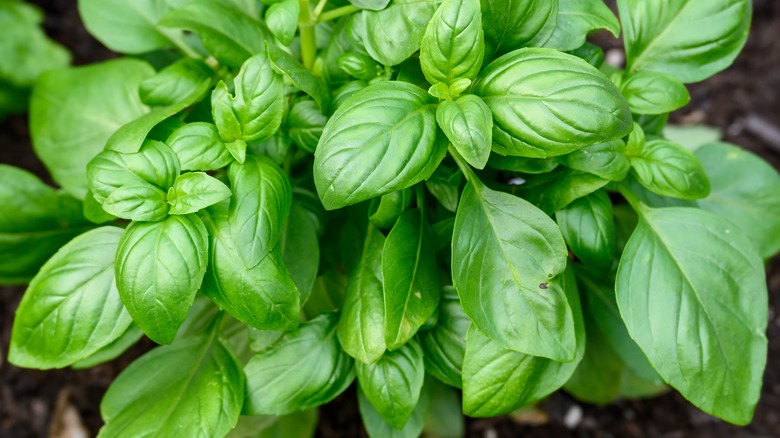Grow These Plants To Help Keep Spiders Far Away From Your Home
Do you ever wonder why spiders seem to have a knack for finding their way into our homes? It's like they have a homing beacon set directly for our cozy living spaces. Spiders are drawn to our homes for several reasons, including the promise of abundant prey like flies and other insects, comfortable hiding spots, and suitable nesting environments. Essentially, they enter our homes because of survival instincts. When you see these eight-legged intruders in your home, it can feel like you're not doing something right. Common practices for keeping spiders out range from keeping a tidy and clutter-free home to sealing up cracks and gaps in doors and windows.
You can do all of that and still find these creepy crawlers entering your house. But here's an interesting twist: Did you know that certain plants might just be your secret weapon in the battle against spiders? We've handpicked ten marvelous plants that are rumored to possess spider-repellent properties, and we're going to delve into each one of them. Let's embrace the green side of pest control and discover how these fascinating plants can help us maintain a spider-free sanctuary.
Plant refreshing peppermint
Peppermint, with its refreshing scent and invigorating taste, isn't just a favorite among humans – it also happens to be an excellent natural spider repellent. The secret lies in the compounds found within peppermint, such as menthol and limonene. According to Healthline, spiders are known to be highly sensitive to strong odors, and the potent aroma of peppermint, particularly the menthol component, acts as a powerful deterrent for these arachnids. The scent interferes with the spider's ability to detect pheromones and other chemical cues, disrupting their communication and navigation, ultimately making your home less appealing for these eight-legged critters.
Peppermint is relatively easy to grow and can thrive both indoors and outdoors. To grow peppermint outdoors, wait until after the last frost has passed in the spring. Select a sunny spot in your garden or near entry points like doors and windows where spiders are more likely to sneak in. Inside, peppermint can be grown all year round. Position pots along windows, doors, or other areas prone to spider activity. You can also crush peppermint leaves and scatter them in these areas to enhance the aroma. Not only will you be keeping spiders at bay, but you'll also enjoy the delightful fragrance of peppermint permeating your living spaces.
Create a perimeter of lavender
Lavender's spider-repelling prowess is attributed to its two primary compounds, linalool and linalyl acetate. These non-toxic compounds are the magic behind why spiders don't like this particular plant. When spiders come into contact with the enchanting aroma of lavender, their sensitive olfactory receptors detect the presence of linalool and linalyl acetate. These compounds create an environment that spiders find highly unappealing and unsettling. The aromatic shield formed by the fragrance disrupts their ability to communicate through pheromones effectively and also confuses their navigation.
Planting lavender can be a delightful way to keep spiders at bay, and the timing for both indoor and outdoor planting plays a crucial role in its success. When planting lavender outdoors, it's best to do so in the spring or early summer after the last frost has passed. Lavender thrives in warm temperatures and ample sunlight. If planting indoors, it's essential to mimic its preferred growing conditions. Pick entry point locations with abundant sunlight, as this will naturally create a perimeter that deters spiders from entering.
Crush some eucalyptus leaves
Eucalyptus possesses a remarkable spider-repelling power, thanks to its compound called 1,8-cineole, which spiders find highly disagreeable. When the leaves of eucalyptus are crushed or bruised, they release a potent and invigorating aroma that is the key to deterring these arachnids. Spiders have a highly developed sense of smell, and 1,8-cineole creates an environment they'd rather steer clear of. This compound interferes with their ability to detect chemical cues and pheromones, disrupting their normal behaviors and navigation.
Eucalyptus is typically grown outdoors, but it can also thrive indoors under the right conditions. The ideal time for planting eucalyptus outside is during the spring or early summer. Choose a sunny spot in your garden or near windows and entryways where spiders tend to make their unwanted appearances. If you're going to plant eucalyptus inside, select a spot with 6 to 8 hours of sunlight. Potted eucalyptus can be strategically placed around entry points, such as doors and windows, to create a fragrant barrier against spiders. You can even crush a few leaves to intensify the scent or sprinkle them in spots you've seen spiders before, like inside cupboards or cabinets.
The citrusy scent of lemon balm
Lemon balm, with its delightful citrusy fragrance and refreshing appeal, has an unexpected superpower of repelling spiders. You can thank its two central compounds for this: citronellal and geraniol. Spiders, renowned for their sensitivity to scents, find the aroma of lemon balm quite off-putting. These citrusy compounds create an environment that spiders would rather avoid, as it affects their olfactory receptors. While lemon balm might be a favorite for herbal teas or aromatherapy, it also serves as a fragrant deterrent to keep your living spaces spider-free.
Lemon balm is a hardy herb that is best planted in the spring or early summer. Outside, find a sunny spot near windows, doors, or other entry points, giving you plenty of options to keep spiders at bay. When planting lemon balm inside, use small pots and place them around your home, particularly near openings or places where spiders often lurk. Crushing a few leaves to release the invigorating scent can also enhance its effectiveness, especially in areas you've seen spiders before.
Use marigolds to create a barrier
Marigolds are vibrant and cheerful blooms that adorn gardens everywhere. You may even already grow them, but did you know they happen to be an enemy of spiders? Marigolds contain the compound pyrethrin, which is a natural insecticide that is toxic to spiders. When arachnids come into contact with marigolds or the surrounding soil, they sense the presence of this compound and are deterred from lingering, making these sunny flowers a formidable force in the fight against eight-legged invaders.
Marigolds are known for their ease of cultivation and flourish in sunny locations with well-draining soil, making them an ideal addition to your outdoor garden. The best time to plant them is in the spring after the last frost has passed and the temperatures have warmed up. Sunny spots are best for marigolds, especially near entry points in your home. If planting indoors, place pots along window sills that get ample sunlight. You can also place dried marigold flowers in sachets and hang them near areas you know spiders are sneaking in from.
Use rosemary to disrupt communication
Rosemary is a fragrant herb loved by chefs and gardeners alike and has an intriguing hidden talent for deterring spiders. This is due to its two central compounds, camphor and 1,8-cineole. When a spider comes into contact with these compounds, it can experience adverse effects. Camphor and 1,8-cineole disrupt the spider's nervous system and interfere with its ability to communicate through pheromones. This disruption creates confusion and discomfort for spiders, prompting them to steer clear of areas where rosemary's scent prevails.
Planting rosemary around your home can be a strategic move to create a spider-repelling barrier. Rosemary flourishes in well-draining soil and requires plenty of sunlight. Plant rosemary near entry points since the delightful aroma will create an environment that spiders would rather avoid. Additionally, you can use potted rosemary plants indoors, near windows, or other potential spider hotspots. Crushing a few leaves occasionally will help intensify the scent and enhance its spider-repelling effect. Want a pro tip? Rosemary won't survive temperatures below 25 degrees Fahrenheit, so make sure to bring it indoors if you live in an area with extremely cold winters.
Citronella is not just for mosquitoes
Citronella is the renowned champion of repelling mosquitoes during summer evenings, but it also deters spiders. Like lemon balm, citronella contains citronellal and geraniol compounds that are quite displeasing to spiders and their acute sense of smell. It masks the chemical signals that they use to communicate and locate prey, making the environment less inviting. Citronella is typically grown outdoors, as it thrives in warm climates and ample sunlight. Consider planting citronella in your garden, preferably near windows, doors, or any other openings where spiders might venture inside.
Depending on the time of year, you may need to protect it from frost or extreme cold. That's why it's best to plant during the warmer months. If you live in a region with colder temperatures, you can still grow citronella inside as an annual plant. However, if growing it indoors proves too difficult, you can use citronella essential oil or candles to release its distinctive aroma and discourage spiders from making themselves at home. When you incorporate citronella into your surroundings, you'll not only enjoy its fresh scent but also create an environment that spiders can't help but avoid.
Grow chrysanthemums for pest control
Chrysanthemums come in a dazzling array of colors and exude a strong sense of beauty, but they are also known to repel spiders. The main compound in chrysanthemums is pyrethrum, a potent neurotoxin for many insects. It interferes with a spider's nervous system, making it difficult for them to seek prey. In fact, according to Loveall Pest Control, many pest-killing chemicals start with pyrethrum because they derive from chrysanthemums, which are easy to grow. When spiders come into contact with chrysanthemums or their vicinity, they detect the presence of pyrethrum and prefer to steer clear.
Chrysanthemums thrive best in sunny locations, making them perfect for planting in your garden or around entry points to your home. Hold off on planting outdoors until the springtime when temperatures have warmed up. Place chrysanthemums near windows, doors, and other areas where spiders may attempt to gain access. The radiant blooms will serve as a beautiful yet potent barrier, deterring spiders from venturing too close to your living spaces. Inside, you can grow them year-round, providing a continuous and beautiful defense against spiders. Situate the pots near openings or commonly visited spider spots.
Catnip isn't just for furry friends
Yes, catnip is a feline favorite that sends them into a frenzy, but it has an unexpected trick for repelling spiders. The secret behind this power lies in the compound called nepetalactone. When spiders encounter the aroma of catnip, they perceive the presence of nepetalactone through their sensitive olfactory receptors. This compound triggers a neurological response, leading to a range of reactions such as agitation, confusion, and disorientation. Essentially, catnip's scent disrupts the spider's normal behaviors and can even interfere with its ability to locate prey and communicate with other spiders.
When it comes to planting catnip outdoors, it's best to do so after the last frost has passed in the spring. This resilient herb flourishes in warm weather and requires a sunny spot with well-draining soil. Outdoor planting allows catnip to spread naturally and provides a more extensive spider-repelling zone around your home. For indoor use, you have the flexibility to plant catnip year-round. Choose a sunny spot near windows or entry points where spiders may attempt to sneak in. Potted catnip can serve as a convenient and effective way to create a spider-repelling barrier within your living spaces. By occasionally crushing a few leaves, you release the enticing aroma, enhancing the herb's effect.
Add basil to your herb garden
You know that basil is an herb that adds a burst of flavor to countless dishes, but it also has the ability to deter spiders. Basil contains estragole and linalool, compounds that disrupt a spider's neurological responses and can cause confusion and discomfort. Spiders rely heavily on their sense of smell to communicate, locate prey, and navigate their surroundings. The potent scent of basil's compounds interferes with these crucial behaviors, leaving spiders feeling disoriented and less inclined to remain in areas where the herb's fragrance prevails.
Basil thrives best in well-draining soil and requires ample sunlight. Plant it in a herb garden near windows to create a natural barrier and easy access when needed for cooking. When planting basil outdoors, it's essential to wait until after the last frost has passed. Basil loves warm temperatures and flourishes in full sunlight, so choose a sunny spot in your herb garden or near windows where it can bask in the sun's rays. Indoors, basil can be cultivated year-round, but it's best to start during the cooler months or when outdoor temperatures drop. Choose a location near sunny windows, where basil can receive at least 6 to 8 hours of sunlight a day.
